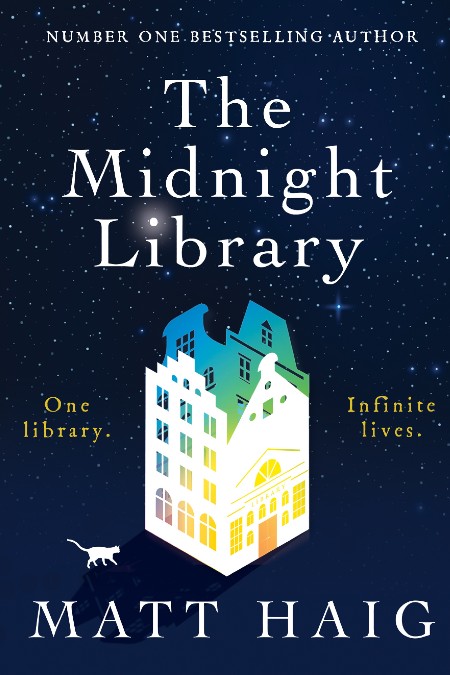
As 2020 has demonstrated with almost devilish glee, life is a LOT.
While it can be gloriously uplifting and fulfilling and loving and rich with endless possibility, it can also feel like the entire weight of the world upon you, a disappointment so raw and gargantuan that coping with it can seem like far too much for one beleaguered soul to deal with.
Bestselling author Matt Haig, who has been open about his mental health journey and sticking with life when death seems like the only viable option, knows exactly how darkly bad and vividly good life can be, and he brings this empathetic insight to this latest novel, The Midnight Library, which tells the story of Nora Seed who finds herself in a weird void between life and death and tasked with the most challenging of dilemmas – what is the best way to live?
It’s a huge question in one sense, and much of the first part of this luminously affecting novel is spend with Nora working out just what that life would look like, but as The Midnight Library moves compellingly and movingly on, it all boils to one simply question – do you even want to live and if so, how?
The question, of course, is simplicity itself and yet it is also not but so beautifully written is Haig’s latest work that this most overwhelming of considerations suddenly begins to feel wholly and entirely dealable.
But that point of relatively decision-making does not come without a great deal of agonising by Nora, who fresh from the loss of her fiancé, job, possible glory-laden careers as either a swimmer, famous lead singer of a band member or a glaciologist and her cat, is consumed by the idea that there is nothing left to live for.
“Even death was something Nora couldn’t do properly, it seemed.
It was a familiar feeling. This feeling of being incomplete in just about every sense. An unfinished jigsaw of a human. Incomplete living and incomplete dying.
‘So why am I not dead? Why has death not come to me? I gave it an open invitation. I’d wanted to die. But here I am, still existing. I am still aware of things.’
‘Well, if it’s any comfort, you are very possibly about to die. People who pass by the library usually don’t stay long, one way or the other.'” (P. 29)
And she’s acted on that; but instead of finding herself very much dead and life gone with no hope of return, she instead finds herself with an influential, caring person from her past in the most unique library she has ever visited where the infinite number of books on the shelves, all green spines of varying shades, speak to the rich possibility with which life comes to us.
If this is all sounds like some sort of sugary fairytale with overtones of movie of the week and inspirational speakers thrown in for good measure, fear not.
Haig has too much applicable life experience, and is far too good a nuanced and insightful writer to serve up easily-digestible pulp/
That’s not to say that The Midnight Library is a difficult read; in many ways, it is not, rich with magically flowing, accessible prose, dynamic, thoughtful characters and scenarios that feel possible and yet not all at once.
But what it does have is a clever, meditative heart, one that understands all too well that it is all too easy to assume that you have come to the end of things and that there is no possible way out.

Haig, who knows more than a thing or two about coming to the end of yourself and finding yourself and life lacking – it’s not as he makes clear, not are you, but he understands how it can feel like that – and he doesn’t pretend that is an easy place in which to exist.
The Midnight Library is no facile journey to a happy ever after (though there is an ending that speaks, naturally enough, to the power of believing in life, with all its flaws and disappointments again even while acknowledging the joyous possibility of being alive), and it doesn’t face up to the fact that life can be fiendishly, horrifically difficult and perplexing and that it can suck all the hope and expectation of change from you.
The key thing that’s not where the book rests; rather, as Nora grapples with her strange new situation, and has to face her life regrets one by one with all the pain and release that entails, she begins to appreciate that perhaps it is her perception that has been off.
Not in some sort of damning way; refreshingly Nora is never presented as someone who has failed or made unfixable mistakes; but then neither is she seen as someone who is essentially a good and lovely person done wrong by life.
She is, and this is what makes The Midnight Library such a wonderfully accessible read, is that she is as flawed and human as the rest of us – capable of so much, and far more loved and cared for than she realises, but also all too able to be led astray by the overwhelming hugeness of life and how we can all too easily be consumed by the disorienting clash between our expectations and resulting reality.
“‘Okay,’ Nora said, in a lower voice. ‘I don’t like this. I want it to stop. I want to cancel my membership of the library. I would like to hand in my library card.’
‘You are the library card.’
Nora returned to her original point. ‘I want it to stop.’
‘No, you don’t.’
‘Yes I do.’
‘Then why are you still here?’
‘Because I have no choice.’
‘Trust me, Nora. If you really didn’t want to be here, you wouldn’t be here. I told you this right at the start.'” (P. 185)
The greatest achievement of The Midnight Library, apart from taking you on a wondrous, fantastical journey through a multiverse of possible lifetimes, which comes with a grounded magic all their own, is that it doesn’t offer up trite answers to some very complex issues.
It lands, not surprisingly, on the life-affirming, positive side of things but this is no glib, slogan-rich trip to a better future.
Rather, this, funny, moving and affectingly imaginative novel looks the darkness in the face, calls it for what it is and deals with it as it actually is, and admits to the fact that life can feel so overwhelming that stepping out of it seems like the only solution.
But, and this is as crucial a “but” as you will ever find in any book, it doesn’t stop the conversation there, taking this openness to the fact that life can be diabolically disappointing and dark and asking how you may deal with that other than killing yourself.
The exploration of this most intensely important of topics is never trite nor simplistic and by placing it in a fantastical context, Haig makes confronting all that loss and pain, not necessarily easy, but perhaps a more approaching and dealable undertaking than it might first appear.
Certainly, your heart is with Nora all the way in The Midnight Library, a story that is vivaciously alive with possibility without once downplaying the idea it might sometimes, distressingly feel like it isn’t, allowing the kind of real, honest, heartfelt discussion that needs to happen if anyone is to face up to the consuming darkness of their life and take life-changing steps towards living through them and coming out the other side rather than surrendering and never taking another meaningful step ever again, something that this most thoughtful and wonderful books understands the lure of but which it gently and with nuance argues passionately against in quietly and memorably transforming ways.
That was my first Matt Haig’s book. Just finished reading it.
What i liked:
-The concept of the book/plot/story.
-Taking heavy issues like anxiouty and depression & making them easy to read, & in a form of novel.
What i didn’t like:
-Too cheesy Christmassy ending.
-Lack of profound poetic metaphoric writing (it was too much straight forward writing for my taste, that was missing a little bit of spices).
And thank you for your review. I totally agree with all what you said.